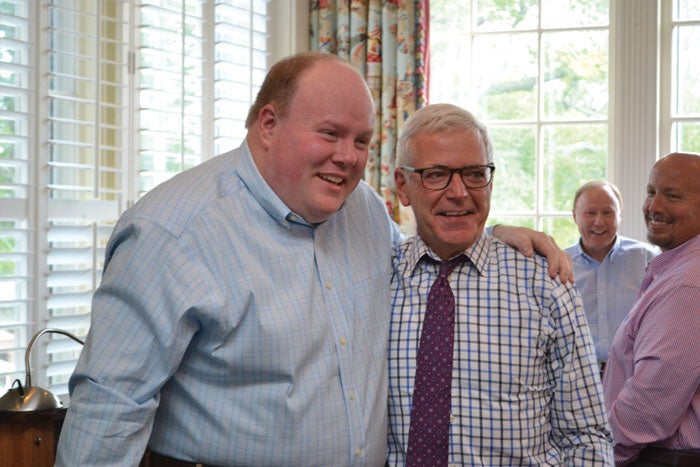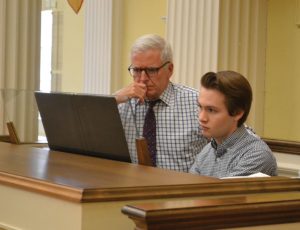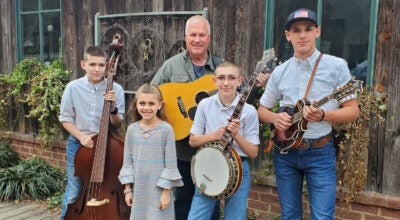First Methodist celebrates Matthew Brown’s 10 years of service
Published 12:00 am Sunday, June 10, 2018

- Matthew Brown and Richard Webster at the luncheon where Brown was surprised with his gift (a song commissioned by composer Richard Webster. In the back in the blue is Michael Brown, Matthew's father, and in the pink is Matthew's brother-in-law, Scott Harrison, who is married to Matthew's sister Heather.
By Katie Scarvey for the Salisbury Post
When First Methodist Chancel Choir members spotted local artist and man about town Clyde on the sidewalk outside of St. Luke’s Episcopal Church, they got a little nervous. As far as they knew, their secret Saturday rehearsals were still unknown to their director, Matthew Michael Brown, and they wanted to keep it that way.

Richard Webster consulting with young Alden Wright, who served as organist during Sunday’s performance of Webster’s piece.
The song they were rehearsing on the sly – a setting of “A Prayer for Musicians and Artists” from the Anglican Book of Common Prayer, 1979 – had been specially commissioned to honor Brown and his 10 years of service to First United Methodist Church. The composer, Richard Webster, would travel from Boston to direct the choir’s performance of it at the end of the service on June 2. It was a grand gesture, months in the making, with many moving parts.
Choir members were nervous enough about the Clyde sighting that they filled him in on the surprise so he wouldn’t say anything to Brown that would tip him off.
Until the day before last Sunday’s performance at First Methodist, when all was revealed, the secret stayed a secret. A small miracle, considering how fast news travels in Salisbury.
……
When Adam Ward left First Methodist 10 years ago for Providence United Methodist Church in Charlotte, he left a legacy of excellence in his service to both the church and the community.
When Brown took over as music director, he began forging his own tradition of excellence at First Methodist, serving as organist and director of various choirs, including the Chancel Choir, and overseeing the Stanback Department of Sacred Music. Brown has also shared his gifts with the larger Salisbury community, in particular through creating the ambitious firstARTS series. That program has brought some world-class performers to Salisbury (including soprano Jennifer Rowley of the Metropolitan Opera, featured in an exquisite performance last November of John Rutter’s “Requiem”). FirstARTS concerts have also supported community nonprofits that serve those in need.
Under his leadership, the FUMC Chancel Choir has sung in the Washington National Cathedral and twice for New York’s Saint Thomas Church Fifth Avenue.
Brown’s choir members wanted to do something special to mark his 10 years at First Methodist. Planning began about eight months ago, when the choir approached Richard Webster, the director of music and organist of Trinity Church, Copley Square, Boston, to compose a piece in Brown’s honor. Webster has held residencies in England at Lincoln, Ely, Chichester, Winchester, St. Paul’s and at Westminster Abbey.
After Webster’s piece was finished, the choir planned to perform it – but of course they’d have to learn it without their director. Fortunately, another Matthew – Matthew Woods, director of music at St. Luke’s Episcopal Church – graciously stepped up.
As part of the secret squad charged with planning and executing the surprise, Martha Smith discovered that covertly arranging for an organ accompanist was not as easy as it might seem. Fortunately, she was able to secure Alden Wright, a talented young organist who is pursuing an undergraduate degree at Eastman School of Music in Rochester, New York – the school where Brown earned a master’s degree in organ performance and literature.
Wright needed to practice on First Methodist’s organ, but Brown couldn’t know about it.
“We took a chance and snuck in when Matthew was attending a function,” Smith said.
Fortunately, Brown did not notice anything amiss.
Brown did not learn of the gift until it was announced at a luncheon last Saturday at the Country Club of Salisbury, arranged by choir member Tina Acree. Long-time Chancel Choir member Jesse McCartney, who led the undercover project with the help of Smith, Jane Creech, Barbara Senter and others, praised Brown’s extraordinary musicianship and his ability to conduct while at the organ by nodding his head at the choir.
McCartney noted that Brown wrestles frequently and patiently with his choir’s southern and midwestern dialects.
Speaking to fellow choir member Jane Creech in the audience, McCartney posed a question: “Jane, why must we close our ‘esses’ precisely and not hiss like snakes?”
The rest of the choir members there – all well-versed in Matthew Michael Brownisms – knew Creech’s response before she said it: Because we’re not that kind of a church.
Jokes aside, Creech said that Brown is “grounded in an enormous, caring heart and a deep abiding faith” and through music, tries to offer “glimpses of God’s beauty and God’s love.”
At the end of the worship service Sunday at First Methodist, Webster led the choir in the debut performance of his version of “A Prayer for Musicians and Artists,” accompanied on the organ by Wright. Brown sat in a position unusual for him: in a pew with the rest of the congregation. Afterwards, a reception was held to honor Brown.
But Brown’s day wasn’t over yet. He still had a firstArts performance of Choral Evensong to direct, followed by yet another reception in his honor at the Utzman-Chambers House.
After the weekend was over, Brown reached out to choir members, who underwrote the cost of the project themselves, via email:
“I am absolutely blown away with your incredible generosity and thoughtfulness this past weekend. It seems most of Salisbury knew about the details, including colleagues who texted and called from across the country last night. I am amazed how you kept everything a complete secret! I had not the slightest clue, and this made it even more meaningful.”






